It was golden hour in late July, the planet’s hottest month ever on record; and at the heart of Boyle Heights’ storied Mariachi Plaza stood Valentina, drag superstar and host of the new series “Drag Race: Mexico.”
Sporting a flipped bouffant hairstyle and a floral wiggle dress that harked back to the 1967 film “Valley of the Dolls,” she’s not just immaculately preened for her inaugural L.A. Times photoshoot; she is miraculously impervious to the summer swelter.
“Write it in the paper,” she told The Times, with nary a glisten on her sun-kissed skin. “‘She was modeling for her life. There was not one drop of sweat. She remained matte.’”
The 32-year-old model, actress and singer swanned her way along First Street and cycled through angular poses against several vivid murals honoring critical figures in Chicano lore, such as mariachi players, Aztec royalty and la Virgen de Guadalupe. Born to Mexican immigrants in the southeast L.A. suburb of Bell, it was only appropriate that Valentina commemorated what’s been her most stellar year in this historical nexus between Mexican and American cultures.
Five years after making her big debut on Season 9 of hit reality show “RuPaul’s Drag Race,” Valentina joined fellow queen Lolita Banana in hosting “Drag Race: Mexico,” which premiered June 22 on World of Wonder’s streaming platform, WOW Presents Plus and Paramount+ Mexico.
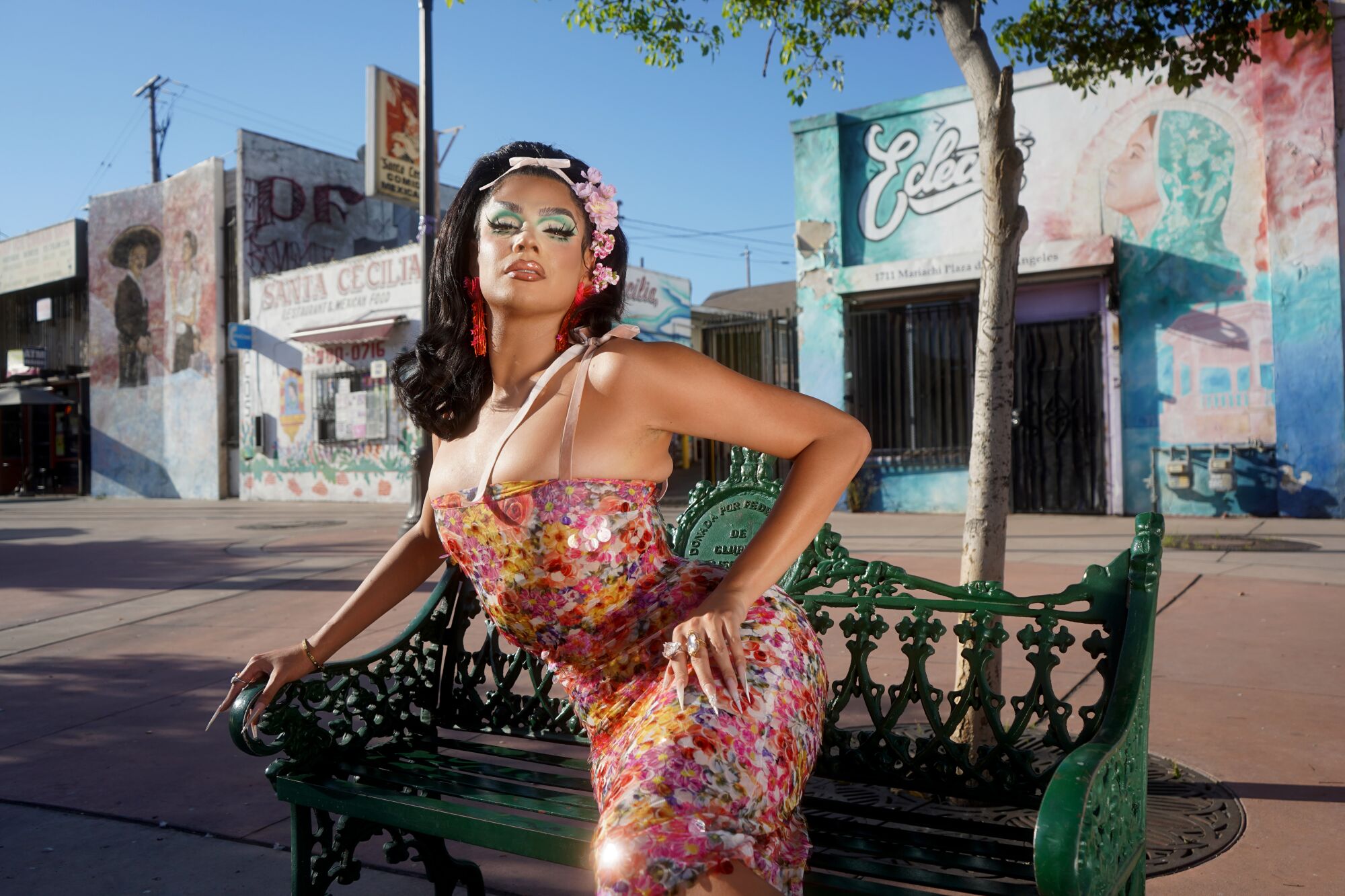
“When I was little, we’d be watching the kids dancing on ‘Sabado Gigante’ and I’d ask, ‘Why am I not doing that?’” recalls Valentina. “I wanted a stage mom. I got immigrant parents.”
(Junior Santillan / De Los)
This summer, the California Legislative LGBTQ Caucus named Valentina a Pride Honoree for her work as a brand ambassador for the Trevor Project, an initiative to address mental health for queer youth. This weekend, she’s receiving the key to the city of Bell; she’s also been designated the role of Grand Celebrity Marshal at this year’s Long Beach Pride Parade, which takes place Sunday. (“It is the most Latino Pride there is,” she said.) There, she will be proclaimed by the state of California as the official “Princess of S.E.L.A.”
“L.A. has this reputation for being fake, but that’s not my experience,” she said later, inside the bustling Boyle Heights restaurant Casa Fina. “It’s fake because there’s so many people coming here trying to make something of themselves. When I’m here, I’m not trying to make something of myself; I am something. And I’m soaking in this moment where I get to embrace being from California, while being proud of being Mexican. I worked so hard to be welcomed and accepted in Mexico for so many years that I kind of forgot… I’m lucky to be from L.A.!”
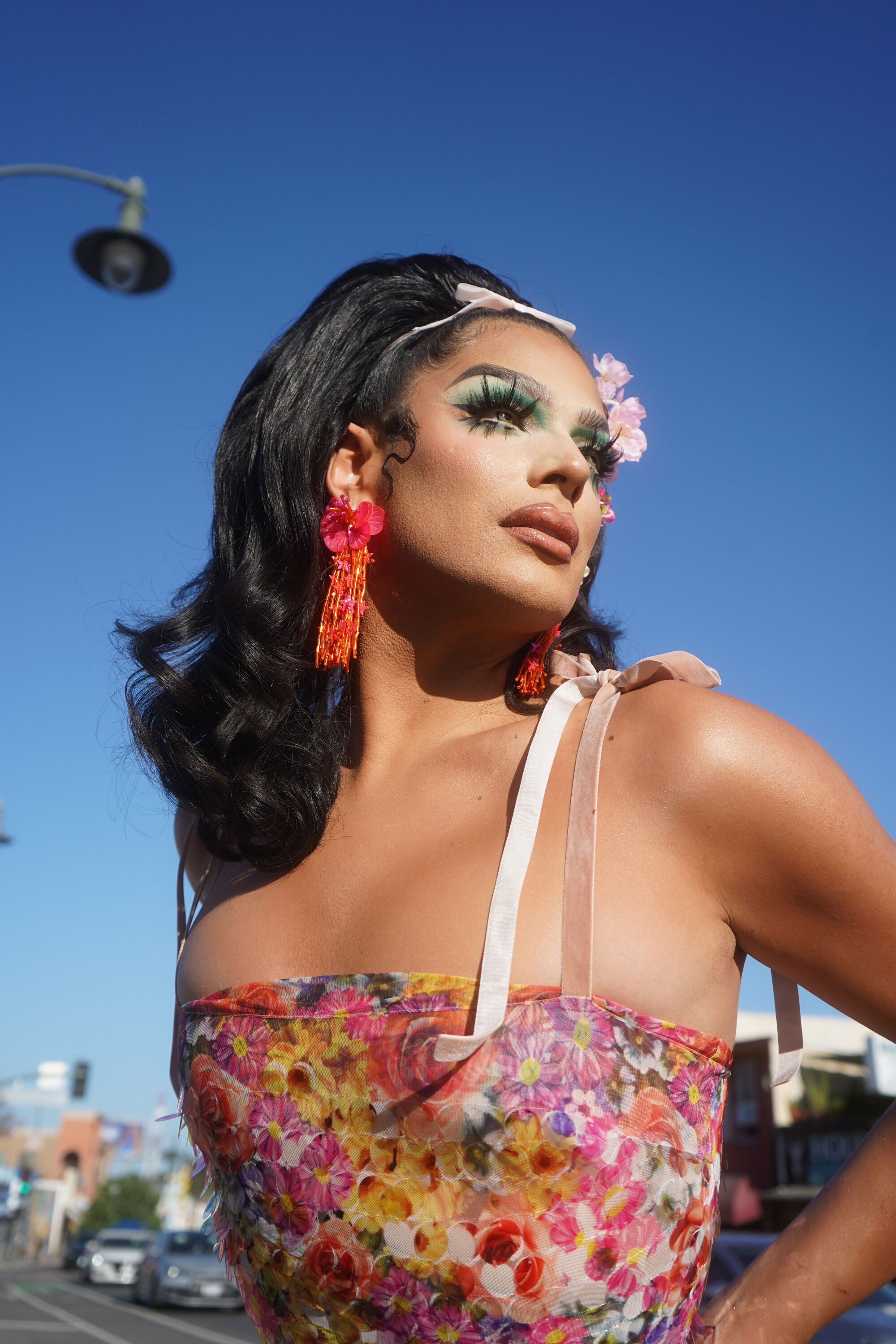
“I always liked to dive deep into that Latina drama, and the glamour of where I’m from,” said Valentina.
(Junior Santillan / De Los)
Long before she kicked off her illustrious career in drag, she was the middle child of three in a working-class Mexican household. Her parents immigrated to the U.S. as kids; her father from Chihuahua and her mother from Zacatecas. The two met at Roosevelt High in Boyle Heights, and began dating not long after. “When I was little, we’d be watching the kids dancing on ‘Sabado Gigante’ and I’d ask, ‘Why am I not doing that?’” recalls Valentina. “I wanted a stage mom. I got immigrant parents.”
Yet Valentina is quick to say that she hardly begrudges her parents, whom she describes as both hard-working and deeply loving. Where she found security and strength in her late father, she also found inspiration from her mother; so much that she tried on her mother’s clothes and, eventually, was discovered wearing her makeup.
“I was curious about femininity,” said Valentina. “When my mother caught me, it was very traumatizing. I was in the first grade and preparing to give my first ever public speech. My mom used to get ready for work and put brushes on her face, so I went and proceeded to touch my face with the brushes. I didn’t know what I was doing. What I was emulating was the ceremony of getting ready.”
Valentina came to explore her passion for performance in various arts magnet programs, including four years at Hollywood High School — which counts alumni such as Cher, Judy Garland and Sarah Jessica Parker. Valentina would wake up as early as 4:30am every morning to catch the bus to school, where she became seasoned in dance, chorus, theater, costume design and all the other accouterments of stage life.
“Once I got into the performing arts world, I was surrounded by monsters, creatures, weirdos, freaks, brilliant geniuses — my type of people,” she said. “It was a melting pot of people from different classes and cultures. I started to realize this life away from home, where I could go far away to Hollywood and be myself.”
Yet to this day, she believes that her best performances have been in private. “I started my career in the mirror,” she said. “I always liked to dive deep into that Latina drama, and the glamour of where I’m from.”
By 2016, Valentina had been working retail at the Prada boutique on Rodeo Drive, when she was suddenly laid off. A frequent spectator of drag shows in and around Los Angeles, she had only been performing in drag for 10 months when she used her little savings to prepare an audition tape for a role in Season 9 of “RuPaul’s Drag Race.” Once cast in the show, she invited her mom and aunts to see her perform a Juan Gabriel number at Club Tempo, a Latin Western bar in Hollywood, for the first time.
“I had to introduce Valentina to my family, because they were going to be seeing a lot more of her,” she recalled of that night. “And they all had a great time — they got the liberty to be away from their husbands!”
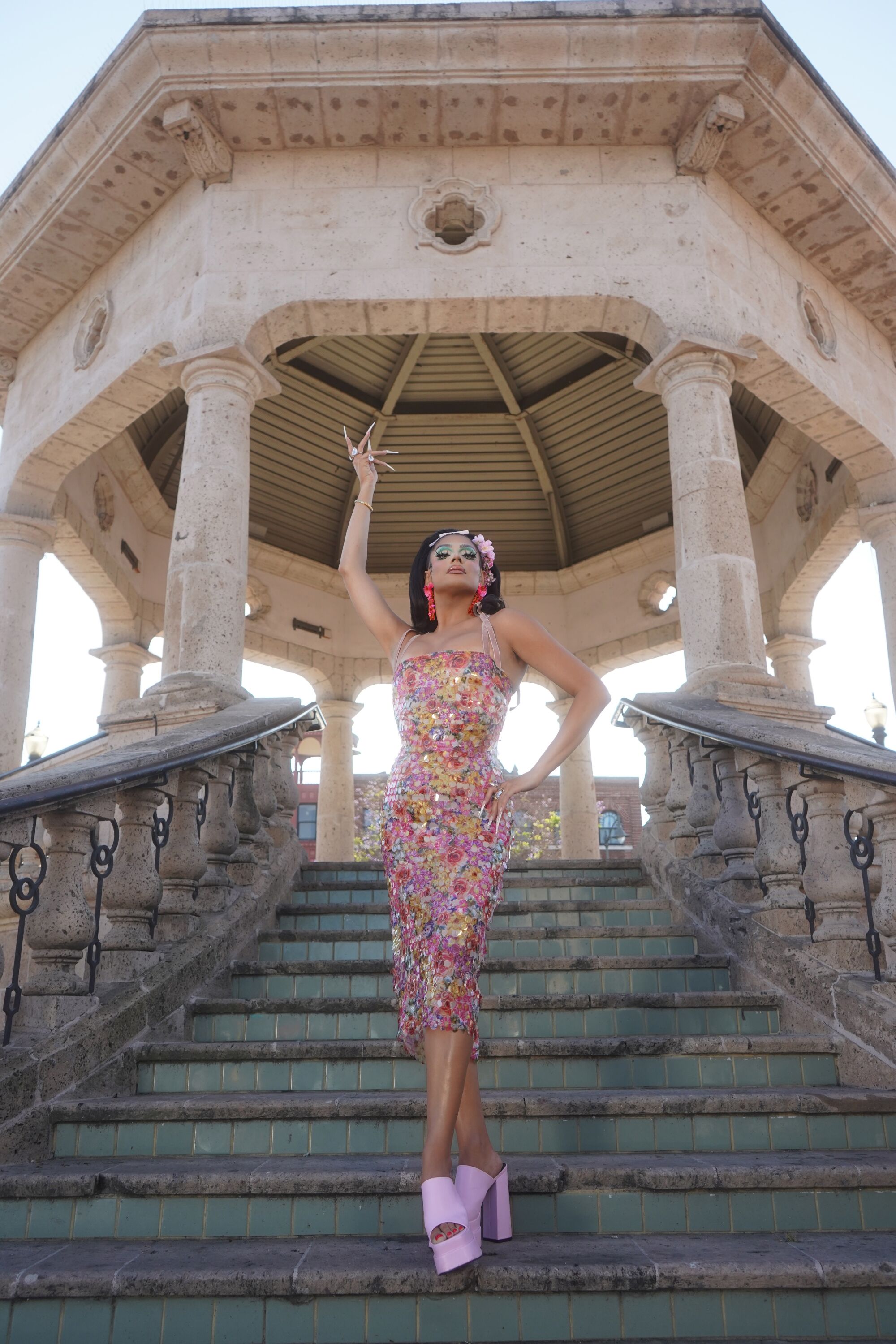
“Even from my position, I’d be questioning myself: ‘Do these girls standing in front of me have any idea that I might be just as nervous as they are?”
(Junior Santillan / De Los)
In her first season of “Drag Race,” Valentina instantly wooed fans and judges with her María Félix-inspired high glam, offset by her kooky, theater kid levity. Although she placed seventh — dismissed by RuPaul after she wore a bejeweled red mask to hide a half-baked lip-sync routine — her unparalleled charisma earned her the title of “Miss Congeniality,” as well as her own web series in 2017 titled “La Vida de Valentina.”
She returned to compete in the 2018 season of “RuPaul’s Drag Race: All Stars.” Although she placed seventh once more, she became a fixture in the “Drag Race” cinematic universe; and with coveted appearances in Vogue and Elle Mexico, she amassed a bigger international fanbase. “When I went to Europe — Spain, Portugal, the U.K. — they’d make me feel like an A-list star,” she said. “They treat me differently over there, like some exotic export. Here, I go through Santee Alley sometimes, looking all hideous, and when I get recognized, I don’t like it. But in Europe, I really feel the fantasy.”
After her first two seasons of “Drag Race,” she landed the role of a lifetime as the lovable Angel Dumott Schunard in the Emmy-winning production of “Rent: Live,” which aired on Fox in 2019. She also featured in Mexican Netflix telenovela “La Casa de las Flores,” followed by a cameo in the 2021 film adaptation of Lin-Manuel Miranda’s hit musical “In the Heights.” This year she played the character of Lydia in “La Usurpadora: The Musical,” a jukebox musical film based on the ‘90s telenovela of the same name.
Yet as she freewheeled into global fame, Valentina had been quietly struggling with the passing of her father in 2019. Despite a lifetime’s worth of dreams coming to fruition, she was soon engulfed by a profound depression.
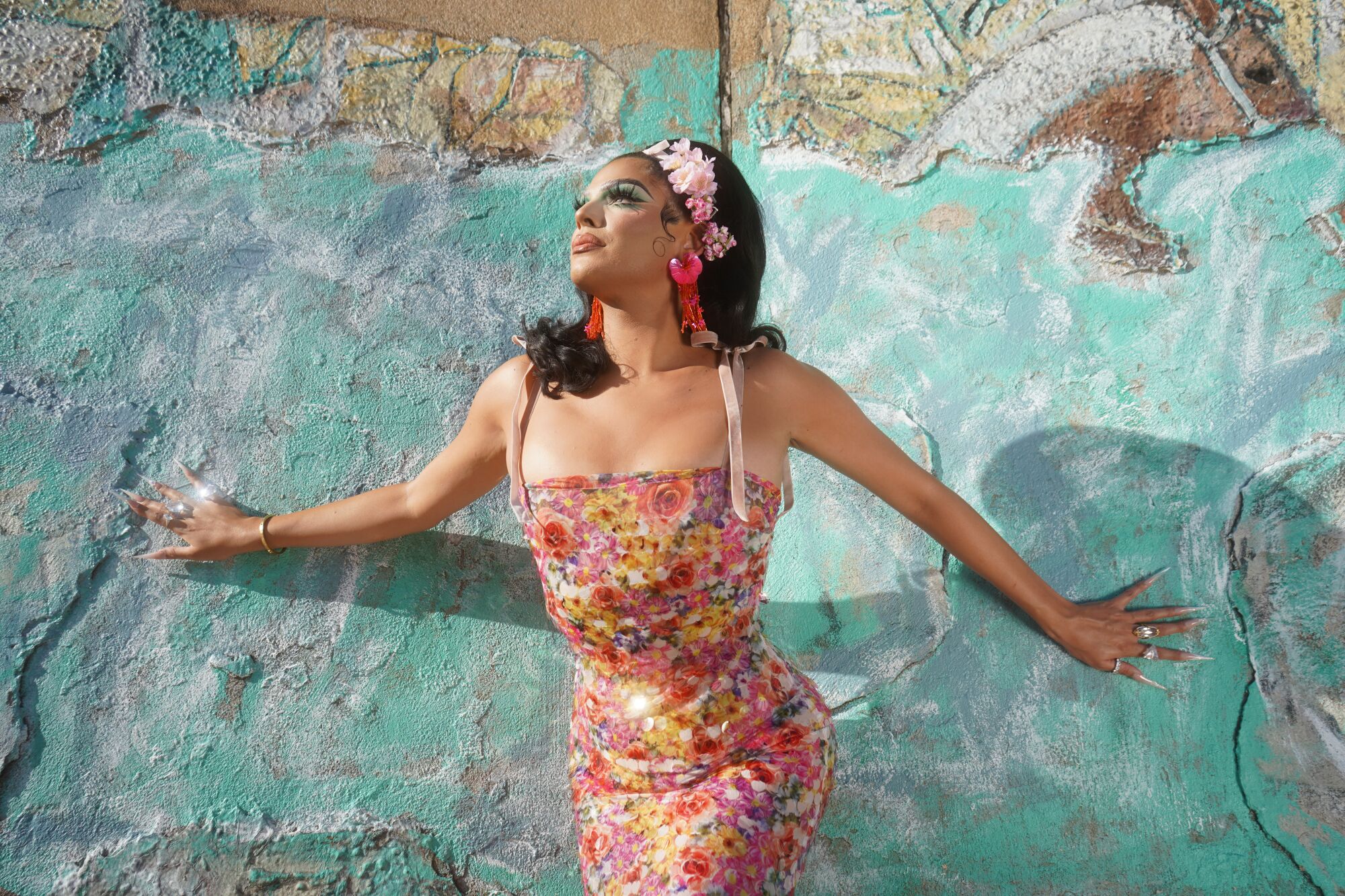
“To embrace my femininity was to give myself another chance and live my life on my terms.”
(Junior Santillan / De Los)
“When my father passed, I contemplated suicide,” she said, as her eyes welled with tears. “I felt like I died. There was no captain of my ship. I didn’t know where to take my life. I’ve been depressed since I was little, but that was the deepest. It is why I started to work with the Trevor Project in Mexico to prevent suicide and crisis in queer youth — I’ve been to that darkest point, and I want to save lives.”
It was after her father’s passing that she realized the most critical life she needed to save was her own. Her plan of self-rescue, she said, began with rethinking her relationship to gender. That year, while promoting “Rent: Live,” she began to describe herself as nonbinary in the press.
“I found that staying masculine was like a badge of honor and respect to my father, Rene Leyva,” she said. “May he rest in peace. I will always carry him in my mind, and in my heart. He loved to read the newspaper, you know. I hope he’s reincarnated and gets a chance at a better, happier life. [But] now that he’s gone, I don’t feel I would shame him for who I am.
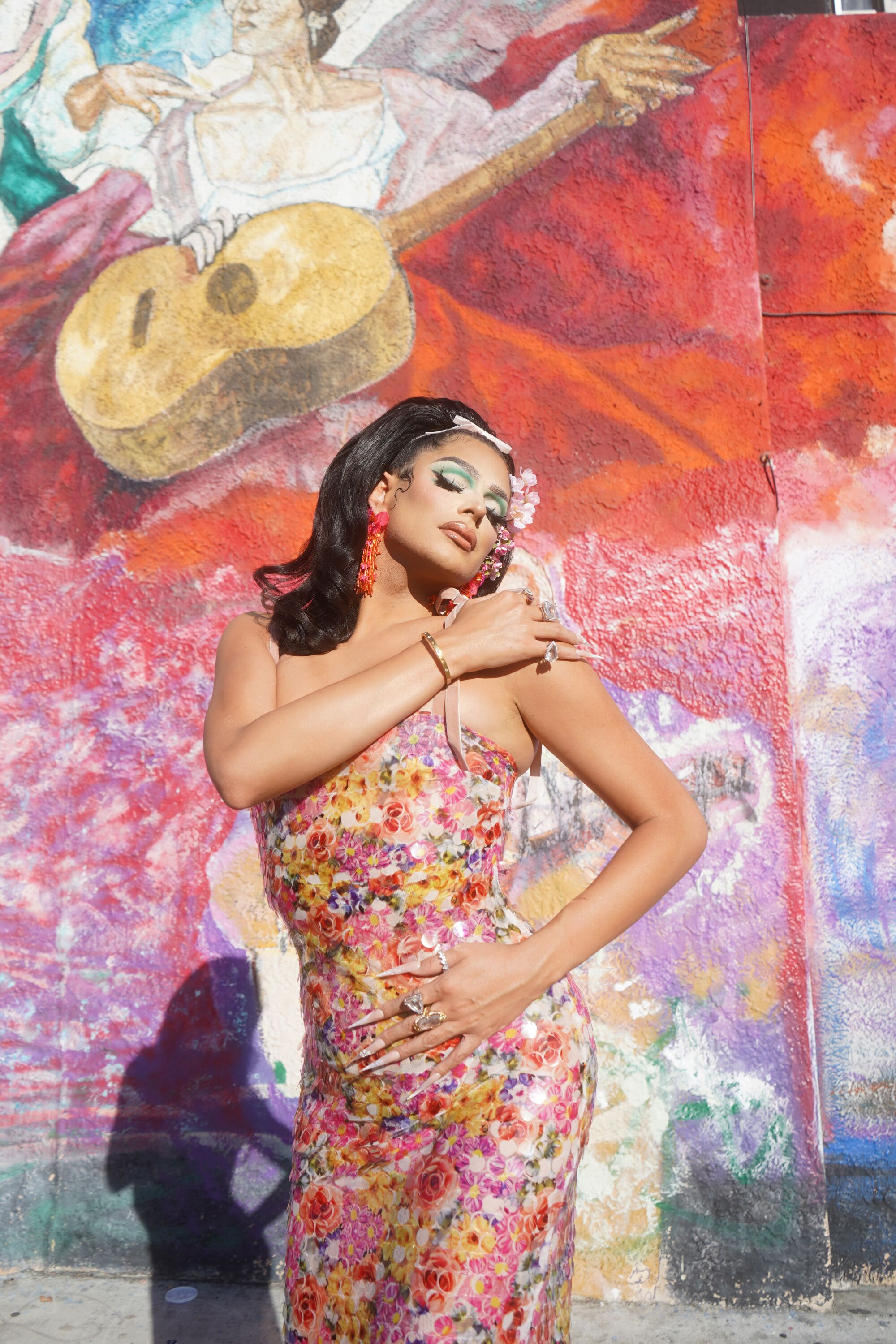
“I don’t want anybody to put a finger on what kind of artist I am, what kind of gender I am.”
(Junior Santillan / De Los)
“To embrace my femininity was to give myself another chance and live my life on my terms.”
Living life on her own terms these days, she explained, means growing her hair longer than ever, and frequenting the more conventionally femme end of the gender spectrum in her daily presentation.
“Femininity is where I found my power,” she said. “Maybe one day, I’ll be a trans woman — but the nonbinary spectrum allows me to shapeshift and explore the many parts of myself. Think of the muxes of Oaxaca, who embrace the third gender. Being nonbinary is full of so many opportunities. If you want them, you can give them a try; if you want to conform, that is OK too. It’s a very common experience to be binary. But to be nonbinary is very freeing, it’s quite punk rock. It rattles up society and how it’s constructed.”
As a nonbinary femme and a Mexican American, Valentina’s gray-area existence is just one of several fascinating complexities traversed in “Drag Race: Mexico.” The contestants, who hail from all over Mexico, bring captivating stories of their own, painting a fuller picture of the country’s drag circuit: an ex competes against an ex, a drag family rivalry bubbles up, and a contestant supports her wife and child with drag.
“I wanted the girls to leave with an experience that made them grow,” said Valentina of the contestants, who spent months together in Bogotá, Colombia, to film the show. “I really hope that the post-show life and experience comes with many blessings for them, They come from many different socioeconomic [statuses], from small towns to major cities. But once you get there to film, it don’t matter. Because you can be the very best with what you got. Your past is thrown out the door, and you just live in the moment!”
The process demanded growth from Valentina, as well. Throughout the season, she and her chic co-host Lolita Banana, an alumnus of “Drag Race France,” navigate their relationships to Mexico and their contrasting places in the diaspora: Valentina, the California girl, and Banana, a Mexico City native who immigrated to Paris. It’s a running joke throughout the show that Valentina, who peppers her Spanish with quippy English phrases, speaks not purely in español but in what they call Valentiñol.
“Even from my position, I’d be questioning myself: ‘Do these girls standing in front of me have any idea that I might be just as nervous as they are?” professed Valentina.
“I get so criticized for my Spanish when I go to Mexico,” she said. “And in the American realm, people hear my accent and say, ‘Oh, she actually speaks English pretty well.’ I was f—g born in California, sweetie! You think I’m here to serve you chips and salsa? You have no clue. I’m every woman. I’m international.”
And yet in spite of her jet-setting, Hollywood lifestyle, it’s apparent that Valentina’s heart is most at home in Los Angeles. It will always be the place where her father first took her to Dodger Stadium, and where her mother first saw her perform. It’s where she assembled her crew of queer Chicanos, architects in the construction of Valentina, the icon: including makeup artist Ernesto Casillas, who clinks margaritas with her hairstylist, Ricky Fraser, at the bar nearby. It’s also where she can run huffing up the hills of Runyon Canyon by sunrise, and go home to her Persian cat, Monchi, by sunset.
“I don’t want anybody to put a finger on what kind of artist I am, what kind of gender I am,” she says resolutely. “Right when you thought you could put your finger on me and define me and put me in a box… I jump out and go, ‘You don’t define me. I define me.’ And what I was yesterday, I might not be today. And tomorrow? I hope I give it sickening, darling.”

